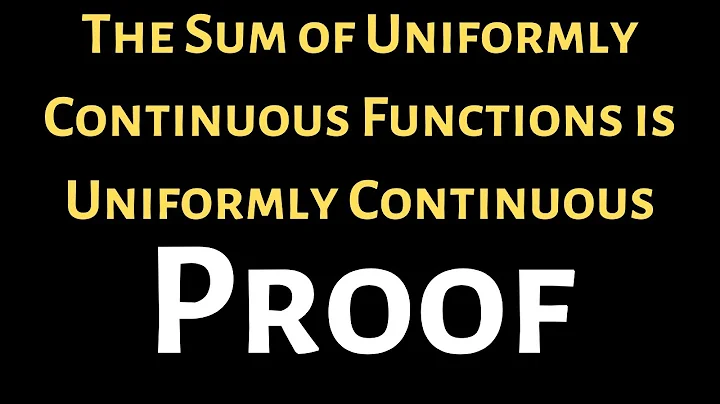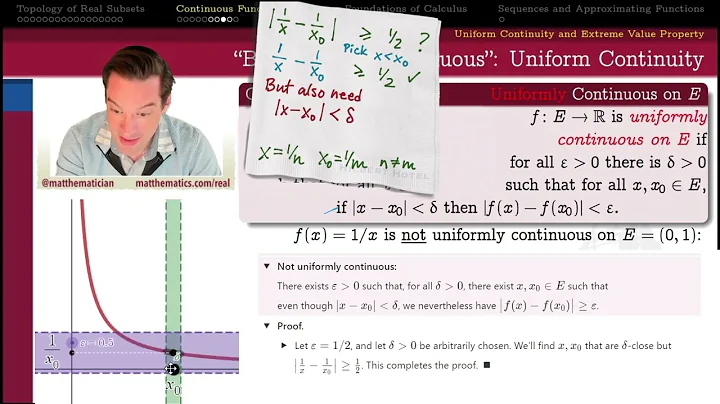Prove That the Sum of Two Non Uniformly Continuous Functions is Not Uniformly Continuous
uniformly continuous function $f$ such that $\sum 1/f(n)$ is convergent?
Solution 1
Let us assume that such a function $f$ exists. From the uniform continuity we get a constant $M > 0$ such that $$ \tag 1 |f(n+1) - f(n)| < M $$ for all $n \in \Bbb N$. In particular $|f(n)| < |f(1)| + nM$, so that $\sum_{n=1}^\infty \frac{1}{|f(n)|}$ diverges (as you already observed).
If $\sum_{n=1}^\infty \frac{1}{f(n)}$ is convergent then necessarily $|f(n)| \to \infty$ so that $$ \tag 2 |f(n)| > M $$ for $n \ge n_0$.
Combining these inequalities it follows that for $n \ge n_0$, all $f(n)$ have the same sign, so that $\sum_{n=1}^\infty \frac{1}{f(n)}$ is absolutely convergent, in contradiction to the above observation.
Therefore no such function $f$ exists.
Solution 2
Assume that $\sum 1/f$ converges. Then for some $N_k \in \mathbb{N}$, $$n > N_k \implies |1/f(n)| < 1/k \implies |f(n)| > k.$$
$f$ is uniformly continuous. Therefore, there exists $m \in \mathbb{N}$ such that $|x-y| < 1/m \implies |f(x)-f(y)| < 1$. By the triangle inequality, this implies $|f(n+1)-f(n)|<m$ for all $n$.
Then if $a, a+1 > N_{\lceil m/2 \rceil} = N'$ are integers such that WLOG $f(a) > 0$ and $f(a+1) < 0$, then $f(a) > k$ and $f(a+1) < -k$. Then $|f(a+1)-f(a)|> 2\lceil m/2 \rceil > m$, contradiction. Therefore, $f(n)$ must not change sign for integer $n > N'$.
So, assume WLOG that $f(n)$ is eventually positive. Note this implies for $n > N'$ and $r \in \mathbb{N}$, that $f(n+r) > f(n)+ rm$.
Write $$\sum_{n=1}^{\infty} \frac{1}{f(n)} = \sum_{n=1}^{N'} \frac{1}{f(n)} + \sum_{n= N'+1}^{\infty} \frac{1}{f(n)}$$
Realize that for the following series whose terms are strictly positive, $$\sum_{n= N'+1}^{\infty} \frac{1}{f(n)} > \sum_{n = 0}^{\infty} \frac{1}{f(N'+1) + nm},$$
and the RHS obviously diverges. Contradiction.
Related videos on Youtube
Comments
-
Does there exist a uniformly continuous function $f:[1,\infty)\to \mathbb R$ such that $\sum_{n=1}^\infty 1/f(n)$ is convergent ?
I know that $\exists M>0$ such that $|f(x)|< Mx, \forall x\in [1,\infty)$, so $|1/f(n)|>1/(Mn) ,\forall n \ge 1$, thus $\sum_{n=1}^\infty |1/f(n)|$ is divergent. But I don't know what happens with $\sum_{n=1}^\infty 1/f(n)$.
Please help
-
Hint: can you figure out how to find an elementary $f$ that alternates in sign at each integer, is increasing in absolute value, and grows at $o(x)$ as $x\to\infty$? (Bigger hint: can you figure out how to take a positive function that satisfies the last two conditions, and make it satisfy the first?)
-
@StevenStadnicki: not really no ... I have no idea what you're talking about ...
-
Try this: can you think of an elementary function whose value at $n$ is $(-1)^n$?
-
@StevenStadnicki: sure; $\cos (\pi x)$ ...
-
Now can you think of a function that tends to $\infty$ at a rate that is $o(x)$? (If you aren't familiar with the terminology $o(x)$, one definition is: $f(x)=o(x)$ if $f(x)/x\to0$ as $x\to\infty$.)
-
@Clayton: there are lots of that kind of function ...
-
@user521337 take one, and multiply it with $\cos(\pi x)$.
-
@ClementC.: So like $x^{1/3} \cos (\pi x)$ ?
-
Product of two uniformly continuous functions is not necessarily uniformly continuous...they must be bounded for that to be true. I wouldn't trust their suggestions.
-
@JefferyOpoku-Mensah You're right. I followed the line of comments without thinking. It's not immediate it works. (And won't for every such choice of functions)
-
@JefferyOpoku-Mensah: indeed you're right ... thanks for catching that ...
-
My apologies on this as well - I was clearly not thinking straight, and the answer below is excellent.
-
-
You should say $|f(n)| \to \infty $ ...
-
I don't see why $f(n)$ s ultimately have the same sign ... could you please elaborate on that ?
-
@user521337: If $f(n)$ and $f(n+1)$ have different sign and both have an absolute value $> M$ then their absolute difference would be at least $2M$.
Recents
Related
Source: https://9to5science.com/uniformly-continuous-function-f-such-that-sum-1-f-n-is-convergent





0 Response to "Prove That the Sum of Two Non Uniformly Continuous Functions is Not Uniformly Continuous"
Post a Comment